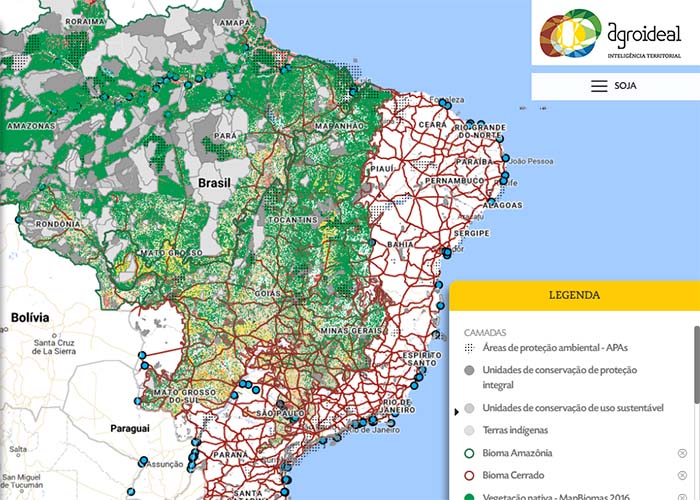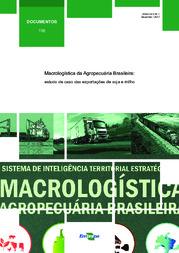Agroideal system helps the assessment of socio-environmental risks
Agroideal system helps the assessment of socio-environmental risks
A territorial intelligence system to assess the socioenvironmental risks associated with investments for the soybean sector is already available for free online access. Agroideal is a tool based on economic and production information to support decision-making on the sustainable use and occupation of soils, aiming at higher economic and productive performance combined with low environmental and social impacts.
Established in 2017, the system was recently updated and allows access to structured spatial information, at city and subcity scale, and also generates reports, maps, graphs and spreadsheets that help in the land use planning of the sustainable expansion of soybean crops and the intensification of cattle production. Initially it has brought data for the soybean chain, followed by the beef one, in contrast with the Amazon and Cerrado biomes, in the Brazilian territory. In the future, the platform will include important information for the soy sector in the Chaco biome, in Argentina, and for the cattle sector in the Paraguayan Chaco.
Territorial intelligence is a multidisciplinary and multisector approach to land use planning which combines quantitative, qualitative and spatial methods. It is grounded on the combination of environmental sustainability and development, on adding value toterritories as spaces for planning and social action, and on the construction of collective intelligence for future land use action, according to The Nature Conservancy (TNC). The environmental organization is responsible for the initiative, with the support of research institutions, non-governmental organizations, Brazilian and multinational banks and companies - including soybean traders - that aim at improving sustainability and mitigating risks in their supply chains.
Presentation of the Agroideal platform
“Agroideal makes information available at one's fingertips. The challenge in the Cerrado is not new, but with the information from the system it is possible to make the planning of practices in the sector sustainable both in environmental and financial terms. In a region like that, with deforested areas and which is habitat to several species, it is crucial to have a reliable source to point areas with higher risk of investment and purchase that are not compliant with socioenvironmental commitments”, states David Cleary, TNC's global director of agriculture.
Technology helps investment with sustainability
Through an interactive analysis platform, it is possible to answer essential questions regarding the sustainable expansion of soybean farming, such as: in which regions would it be more interesting to invest in sustainable expansion and origination? Where is it possible to obtain higher returns of investment combined with reduced environmental and social impacts? How can we define and implement efficient sustainability policies and policies to curb deforestation for such commodity at stake? “It is a new business planning outlook for the sector, in which socioenvironmental commitments become part of the decision-making process firsthand and not just at the stage of monitoring daily soybean purchases by traders”, assesses the Agroideal coordinator, Flávia Pinto, from TNC.
“Embrapa finds Agroideal and the alliance with farmers an opportunity to add value to the public information the corporation and other institutions produce. The integration of information from multiple sources in an open, free, user-friendly platform broadens the knowledge base for intelligent decisions in our agrobusiness. Agroideal is an example of partnership between the public and private sectors that values our skills and our way to make businesses sustainable,” declares the researcher Silvia Massruhá, head of Embrapa Agricultural Informatics.
The platform displays countless maps, suggested by experts, for fast visualization of the agronomic, social and environmental status in the Cerrado and the Amazon regions. The specialists also pointed out how to cross such information to create indicators that generate territorial intelligence for the sector. “Cerrados are arguably Brazil's last agricultural frontier. Deforestation, agricultural expansion and forest fires have destroyed an extensive area of such biome and the demand for soybeans exerts enormous pressure on the region. Agroideal helps companies meet such demand with lower environmental and social impact”, Flávia Pinto states.
For the Amazon, for instance, the system brings important indicators regarding the sector's zero deforestation pledge, such as the ratio of areas that have been blocked by the soybean moratorium, a calculation based on Abiove's official map of non-compliant soybean areas during the 2016/2017 crop year, and the supply of cleared pasture areas that are suited for soybean plantation.
Economic opportunity and yield maps
The tool makes it possible to evaluate a business plan considering the economic opportunity and the socioenvironmental risk indicators selected to generate a map of a given region's exposure to risk. This map presents a simple, scale of four colors that represent regions or cities with high or low economic opportunity and high or low socioenvironmental risk. The system also allows the comparison between business plan scenarios, in order to facilitate decision-making with full information.
The final report produced from system data allows the user to assess the most influential indicators both in the axis of economic opportunity and in the socioenvironmental risk one, and hence incorporate such information in their regional development strategies to plan the expansion over previously deforested areas, reducing the conversion of natural areas and minimizing environmental and social impacts. The main goal is to enable companies in the soybean sector to incorporate socioenvironmental commitments in their business plans' decision-making process to define where to expand or to buy their commodities.
Especially aimed at sector agents, researchers and managers, the platform also counts on the first Embrapa results about the current relative soybean yield in the Cerrado biome. “The system now offers the current yield average, as well as reference yield figures for more favorable and less favorable years, which especially helps rational decision-making in light of risk and production opportunities”, explains the researcher Aryeverton Fortes de Oliveira, Embrapa's technical coordinator in the cooperation agreement with TNC.
Another novelty is the inclusion of the Amazon soybean mapping conducted by Agrosatélite for the 2016/2017 harvest. Soon the data about this harvest for the Cerrado, produced by the same company, will be included. In addition, Agroideal brings updated information about the Rural Environmental Registry (Cadastro Ambiental Rural - CAR), supplied by the Brazilian Forest Service (SFB), to help assess territories' compliance with the sector's commitments related to the Forest Code.
Agroideal relies on funding from Bunge and the Gordon and Betty Moore Foundation, and integrates the Collaboration for Forests and Agriculture (CFA), a cooperation initiative among several institutions, including the National Wildlife Federation (NWF), the TNC, the World Wildlife Fund (WWF), the Gordon and Betty Moore Foundation, and other partners. CFA's aim is to contribute to eliminating deforestation and the degradation of tropical and subtropical ecosystems that can occur due to the global production of agricultural commodities, in the soybean and beef chains.
About TNCThe Nature Conservancy (TNC) is a global environmental conservation organization dedicated to the large-scale preservation of lands and water on which life depends. Guided by science, TNC creates innovative and practical solutions for the world's most difficult challenges, so that nature and people can prosper together. Working in 72 countries, the organization uses a collaborativeapproach, which involves local communities, governments, private sector and other partners. In Brazil, where it has been working for 30 years, TNC promotes initiatives in all main biomes, with the aim of making the economic and social development of these regions compatible with the conservation of natural ecosystems. TNC's work concentrates on actions related to Sustainable Agriculture, Water Security and Intelligent Infrastructure, and Ecological Restoration and Indigenous Lands. |
Translation: Mariana Medeiros
Nadir Rodrigues (MTb 26.948/SP)
Embrapa Agricultural Informatics
Press inquiries
informatica-agropecuaria.imprensa@embrapa.br
Phone number: +55 19 3211-5747
Maria Paula Angelelli
TNC Press Office
Tatiane Matheus
TNC Press Office
Further information on the topic
Citizen Attention Service (SAC)
www.embrapa.br/contact-us/sac/


